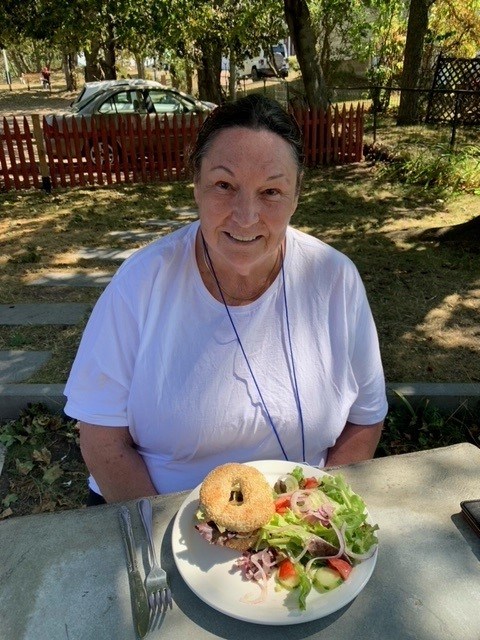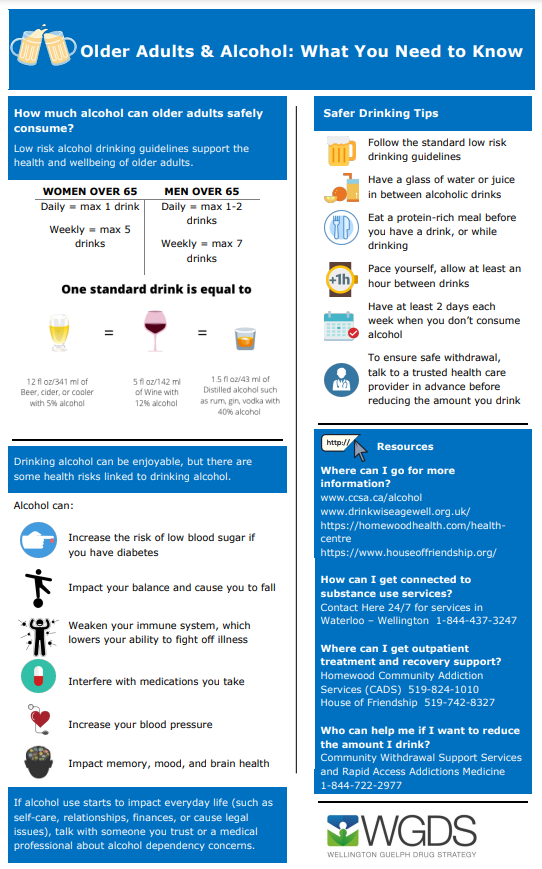Many people think addiction to alcohol and/or drugs is a concern that only affects younger people, but this is incorrect. Older adults are the fastest growing subgroup of the Canadian population and with this, it is expected that substance use will continue to rise within the population as well. Various age-related changes result in older adults being more at risk of harmful effects pertaining to substance use. We may not have changed the amount of substances we are consuming, but as we age, our bodies become more sensitive and process things at a slower rate. Another thing to consider; we may be taking more medication which increases the risk of harmful drug interactions.
But here’s the good news. Help is available, and recovery is possible, at any age.
Just ask Barbara Gray. “I've been an alcoholic for as long as I can remember - now I’m sober, never give up. There’s always hope, somehow, someday you can reach peace and sobriety. There’s lots and lots of help out there. Keep trying until you find what’s right for you.”

Barbara highlights, “I'm 70, I only reached sobriety very recently. It’s never too late! It may seem daunting to change habits of a lifetime, but with support it can be done. It’s worth it to be freed from the burdens and costs of substance use. Reach out if you or someone you care about needs help.”
Types of substances can include:
- Tobacco
- Alcohol
- Prescription drugs (pain relievers, sedatives, stimulants)
- Cannabis
- Illicit drugs (cocaine, ecstasy, methamphetamine)
When an older adult has a decline in their overall health, those around them, including medical professionals, may assume that this is due to the aging process. We should all be aware that the signs of substance misuse are similar across age groups, they include:
- Loss of co-ordination, falls, slurred speech
- Problems sleeping
- Decline in personal hygiene
- Irritability, depression or confusion
- Stomach problems, loss of appetite
- Covering up the extent of their substance use
- Tension with family, friends, lack of interest in staying in touch
- Desire to be alone
- Signs of withdrawal such as a racing pulse, tremors, and agitation
There are a variety of factors that contribute to an increase in substance use. Many older adults face these risks on a regular basis and there could be a combination of issues.
- Chronic pain/illness, reduced mobility, poor health status
- Social isolation
- Lifestyle changes: retirement or change in living situation
- Grief and loss
- Financial stress
If your substance use has been negatively affecting your everyday life, talk with someone you trust or let a healthcare professional know. You are not alone, and your family physician will not judge you when you share that you are struggling with substance use. The first step to tackling any problem is acknowledging it yourself. Like Barbara said “It’s never too late.”

*WATCH* A special pre-recorded event that shares Barbara’s personal /journey along with a geriatrician’s presentation on falls and the effects of alcohol as we age
Where can I access free mental health and substance use support?
- Wellness Together Canada | Home is a platform for Canadians funded by the Government of Canada. Speak with a counsellor by calling 1-866-585-0445
Where can I get information about substance use and recovery support services for myself or a family member?
- Here 24/7 – 1-844-437-3247 (HERE247) – Addictions, Mental Health & Crisis Services
- Addiction Treatment - House Of Friendship
Where can I get outpatient treatment and recovery support?
- Homewood Health - CADS
- RAAM Waterloo Wellington – RAAM Waterloo Wellington – Rapid Access Addiction Medicine Clinic (raamww.ca)
Who can help me if I want to reduce the amount I drink?
- Community Withdrawal Support Service (CWSS) – Stonehenge Therapeutic Community (stonehengetc.com) Contact 1-844-722-2977
March is liver health month, learn more about risk and prevention:
Submitted by The Older Adults Strategy and The Older Adult & Substance Use Working Group, both of Waterloo Wellington.
